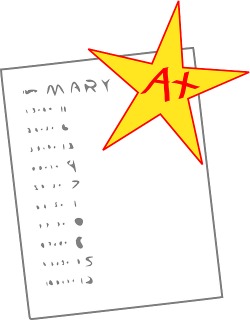- Home
- Teaching Strategies
- Educational Testing
Using Educational Testing in Your Home Program

Educational testing is an important part of teaching children any subject. In this article I will outline several ways to find out if they know what you’ve worked so hard to teach them.
It’s also important to remember to first give them the information they need to learn, such as how to read or how to work addition equations. And they need the information repeated, often many times. Once they’ve been given the information a number of times, you can then occasionally test to see how much they remember.
This may seem like a no-brainer, but it’s easy to get caught up with lots of testing without actually giving them the information they need enough times. I’ve made this mistake, and it’s easy to fall into this trap.
But with that said, you’ll need to know at some point how much information they remember.
This is where testing and quizzes come in. But how do you go about testing them?
Here are a few simple, effective ways to find out what they‘ve learned.
Ask and Point Educational Testing
In this method of testing you simply ask them a question and have them point to the answer. You of course would need to have more than one answer for them to choose from.
If they can read, all you have to do is write the choices down on paper. If they can’t yet read, you can use pictures. Cut them out from magazines or print them out. You may also be able to find educational picture books in which the copyright notice allows for photocopying its pictures. Or use the book without copying anything if that works.
Another option is the Boardmaker program. This program is especially designed for printing out pictures to use for special needs children. You can print the pictures out with or without labels, depending on your child’s needs.

Placing Rewards On Correct Answers
Our speech therapist gave us this wonderful idea. What I really like about this method of educational testing is that you’re accomplishing two things at once: rewarding good work and testing your child’s skill level.
When my son was going through the Moving Across Syllables program, the therapist would ask him to say each word on the page. If he said the word correctly, she would place a chipper chip on the word. After he had finished the page, she could quickly see which words he got right and which ones he missed.
This method obviously works well when you’re using some type of paper or worksheet.
Just about any small reward will work well here: chipper chips, stars, removable stickers, small food items, etc. See this article on rewards for a list of ideas. The important thing is to use a reward that they really like. Otherwise, it’s not really a reward for them.
Recording Right and Wrong Answers
Therapists tend to use this technique a lot, especially speech therapists.
When you’re asking for verbal answers, simply jot down each right or wrong answer. It’s quick and easy and takes almost no time at all. Our therapist used pluses (+) for right answers and minuses (-) for wrong answers.
You can choose to record your child's answers as often as needed.
Quizzes
All the above ideas work well for a lot of situations you’ll encounter, but chances are, you’ll occasionally need to give your child actual tests or quizzes to find out how much they have learned.
You can make up all your own quizzes. This can work well for some people, but many of us simply don’t have the time.
Another option is to go online for quizzes that are done for you.
Education Quizzes is an extremely helpful educational testing resource that provides a wealth of quizzes to choose from for a small monthly fee. And these are all online quizzes that are fun for kids who might find regular tests to be boring and tedious, or even stressful. These fun quizzes can take the stress out of tests for our kids who need as little anxiety as possible in their lives.
These online quizzes are not only good for testing but also another great way to review what they’ve learned.
Please note that I receive no financial compensation for mentioning Education Quizzes. I mention this as a resource that can be highly useful for many children.



New! Comments
Have your say about what you just read! Leave me a comment in the box below.